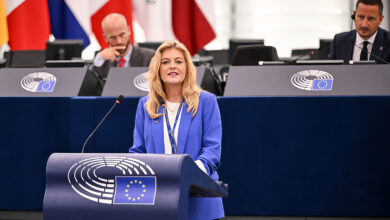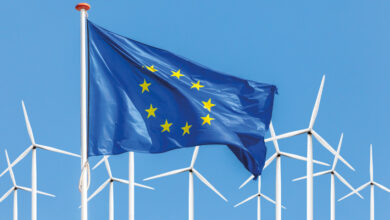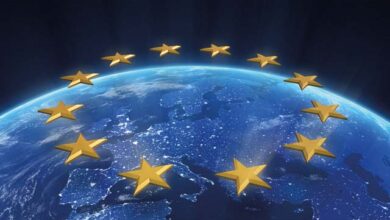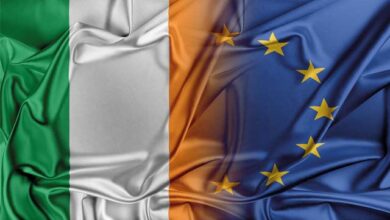Gay Mitchell
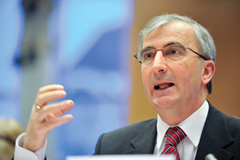 In the first of our interviews with MEPs, Gay Mitchell talks to Stephen Dineen about Ireland’s influence in the EU and his work in the European Parliament.
In the first of our interviews with MEPs, Gay Mitchell talks to Stephen Dineen about Ireland’s influence in the EU and his work in the European Parliament.
A deficit of leadership is hardening public opinion against Europe and Ireland’s political leaders must energetically explain the European Union’s achievements to the people. That’s Gay Mitchell’s message as he assesses the State’s position in Europe and shares his perspective on the way forward for the continent.
“We, for far too long, spoke to people about the money we got from Europe,” he recalls, pointing out that money was invested by Germany, France and others to develop economies such as Ireland and bring them into the single market. At a certain stage, those growing countries would ‘pay their way’. The EU, he contends, has no interest in taking away Ireland’s neutrality or dictating laws from Brussels. The purpose of the European Union is, in his view, best explained by history, particularly the deaths of 60 million Europeans in two world wars: “So if Europe is about peace and stability, how do we live together? What things do we want to do together? What things do we want to keep for ourselves?”
Furthermore, the EU gives Ireland much greater influence on an international stage than it would otherwise have: “We’re in a powerful organisation where we have a real say which is at the same time widening and deepening.”
Irish influence includes 12 MEPs (when seven would be proportional), a ministerial seat on the Council, a Commissioner, and the current and previous secretaries-general of the Commission. At the UN, by comparison, Ireland has never had a Secretary-General, has not held the General Assembly presidency since 1961, and can be vetoed by the five permanent Security Council members.
Standing up
First elected in 2004, Mitchell has chosen to sit on one external committee (development) and one internal committee (economic and monetary affairs).
International development is clearly a strong passion. He sits as the joint co-ordinator for the European People’s Party (EPP) group on that committee and has fought for the Parliament to have a clear say in development policy.
In July 2009, he was asked to take forward the Emergency Food Regulation, José Manuel Barroso’s response to food riots in the Third World with an intended budget of €1 billion.
“With 100 days, we agreed the law and we got the billion,” he relates. Mitchell gained a seat on the budget negotiating committee, with the bottom line that the budget would not be agreed unless the money was forthcoming. The package also helps farmers to vaccinate animals and grow their own food, to prevent future shortages.
In September 2010, he was honoured to lead the Parliament’s team in the UN’s review of the Millennium Development Goals.
“Why is that [development] important for Irish people? First of all, because of humanitarian reasons: we all share this world. But secondly for selfish reasons,” he stresses. “By 2050, the population of the world will have increased by 2 billion. Ninety per cent of that extra population will be in what is now the developing world.”
The status quo would lead to major conflict and south-to-north migration but he adds: “If on the other hand, we turn it around, they will become our trading partners.” Mitchell predicts that poverty can be eradicated if wealthy countries met their commitments to spend 0.7 per cent of gross national income on development aid. Ireland’s figure is 0.5 per cent.
Mitchell seeks to protect Irish interests on the Economic and Monetary Affairs Committee, including the IFSC in his own constituency. Before the financial crisis, he helped to persuade then ECB President Jean-Claude Trichet that inflation was rising; low interest rates were good for price inflation but not asset inflation.
Then in late 2010, he became aware that French and German committee members had signed a declaration, calling for the end of Ireland’s 12.5 per cent corporation tax rate. This had no legal weight but would have damaged Ireland’s image if passed. Mitchell “went on the warpath” over this and enlisted the help of Proinsias De Rossa, Pat the Cope Gallagher and Marian Harkin within their groups. It eventually received 70 votes.
Mitchell also organised a series of meetings between Commissioner Olli Rehn and Irish MEPs, which led to Rehn’s support for a lower interest rate on the European Financial Stability Facility.
Economic recovery
That said, the Irish public is increasingly Eurosceptic (see pages 18-19). Asked if the public’s concerns are confirmed by the way the European project is being directed, he rebuts the suggestion with an optimistic view of its history.
“Look, what’s happening in Europe is miraculous. We should start believing in miracles more,” Mitchell asserts. He had not believed that the Berlin wall would fall in his lifetime but a chip of it now hangs in his home.
Mitchell intends to monitor the implementation of the “necessary fiscal rectitude” over the remainder of his term in office but agrees with ECB President Mario Draghi that creating confidence is essential for investment.
“We have a stability and growth pact, as it used to be called, so ok we’re working on the stability side of it, now we need to see the growth side of it,” he states. “People like Mr Sarkozy and Mrs Merkel and others need to hear that.” Talking to French and German MEPs helps to “carry the message back”.
When history is written, he expects the European Parliament to be remembered well for its role in tackling the economic crisis. Resolving Europe’s economic crisis is a massive task: “It’s like when you have a fish on a line. If you pull that line too quickly, it’ll break, the fish gets off. If you let it loose, the fish wriggles off. So you’ve got to land that fish by being patient and staying with it.”
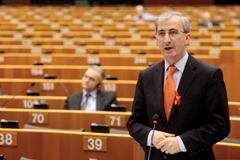 Presidency ‘needs global role’
Presidency ‘needs global role’
Michael D Higgins is doing a “fine job” but the office of the presidency should have a stronger international profile, by promoting Irish business overseas, Mitchell remarks. “A President could really make a difference in going out into Asia and telling Asians: ‘This is a country that is open to business and has a bright, bright future.’”
Assessing the campaign, Mitchell is philosophical about his own result (6.4 per cent): “My views weren’t carried on this occasion. I’ve won and I’ve lost in the past.” He also defends himself as a principled candidate, dismissing “the idea of appealing to people on the colour of your shirt or telling them what they want to hear.”
The campaign was a “very big test” with seven candidates and it would have been hard to achieve both a Fine Gael Taoiseach and President. “And a whole lot of things went wrong,” Mitchell continues, “but I put [out] what I wanted to say. I put out my stall. I wanted that job because I believe in the things I am talking about. I wanted to do something about the state of the country and I’ve no regrets.”

